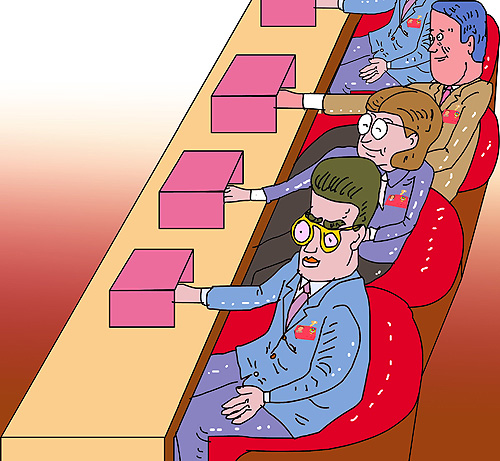|
 |
|
(LI SHIGONG) |
At this year's full session of the National Committee of the Chinese People's Political Consultative Conference (CPPCC), the country's top advisory body, 14 members jointly put forward a proposal: to cover the "telepads" used for anonymous voting at the Great Hall of the People in Beijing for the purpose of protecting voters' privacy. The Great Hall of the People is where CPPCC National Committee members and deputies to the National People's Congress (NPC), the top legislature of China, hold their annual sessions.
A comfortable voting environment is one that encourages voters to express their intentions and ideas, and it also shows respect for NPC deputies and CPPCC National Committee members, said the proposal submitters.
As for the suggestion to cover the casting of votes, there are supporters and opponents.
Supporters believe the technical update will enable the voters to express their real opinions--and help democracy. Opponents argue that whether NPC deputies or CPPCC National Committee members enter affirmative, dissenting or abstention votes, their vote for any of the options is a legitimate right conferred by law.
China's people's congresses and CPPCC committees at various levels have seen several changes of voting methods, from show of hands to anonymous voting. The electronic voting system in the Great Hall of the People was put into use in 1990. Nowadays, on the desk for every seat in the auditorium of the Great Hall of the People, there is a palm-size telepad, with three buttons, green for "yes," red for "no" and yellow for "abstain." The voting system only records the total number of affirmative, dissenting and abstention votes and omits who votes on any particular issue. But everyone's vote cast is exposed to others, especially if a meeting is broadcast live.
Promoting democracy
Xu Yunpeng (hlj.rednet.cn): Pressing the telepad in anonymous voting is a kind of secret ballot. It will encourage voters to cast ballots more freely in accordance with their own intentions. The secret ballot is an international practice prevailing in many other countries. France has adopted secret ballots since its Revolution, while regulations on secret ballots appeared in the New York State Constitution during the U.S. War of Independence. Those who have visited parliament buildings in many other countries must have noticed there are covers over voting telepads. In China, it is regulated in the Electoral Law that people's congresses at various levels adopt secret ballots, with a view to protecting the democratic rights of deputies.
Since the "yes," "no" and "abstain" buttons on voting telepads are distinctive and--without the protection of covers--choices might be disturbed by others, why not add small covers to the telepads so as to make the voting more fair and free?
Sui Haitao (Peninsula Morning Post): Although some people don't care whether they vote is discovered by others or not, most people are not willing to show to others their true choices. It's great some people dare to speak out about what they want to say and it's also understandable if others don't want to.
| 